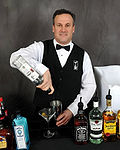History

One of the first fern bars was the original T.G.I. Friday's on the corner of 63rd Street and First Avenue in a neighborhood on the Upper East Side of New York City, where many young single adults lived at the time. The founder, Alan Stillman, borrowed several thousand dollars from his mother, leased a saloon and remodeled it, converting the ambience to one that he thought might be attractive to young single women. The bar opened on March 15, 1965 and was soon copied by other restaurants in the neighborhood. [1]
Another early fern bar, [2] also thought to be the original birthplace of the Lemon Drop martini, was Henry Africa's in San Francisco, California. [3] [4] The bar opened in 1969 at Broadway and Polk Streets by out-of-work veteran Norman Hobday, who by his own account "took the opium-den atmosphere out of the saloons" in favor of "antique lamps and Grandma's living-room furniture." By some accounts Hobday copied the concept from another restaurant, Perry's, [5] which opened several months earlier and was made famous as a singles "meet market" by Armistead Maupin's novel, Tales of the City . [6]
Hobday closed the establishment in 1986, [7] and opened up Eddie Rickenbackers, [3] [8] another eclectic bar, the next year.
